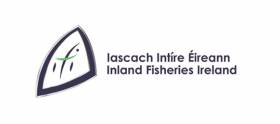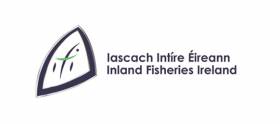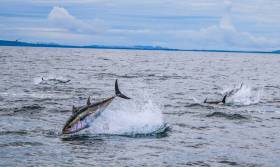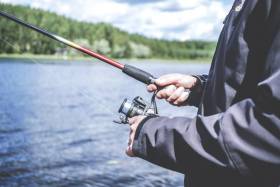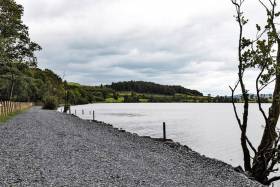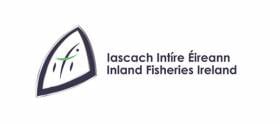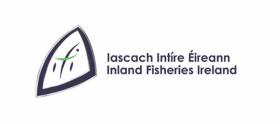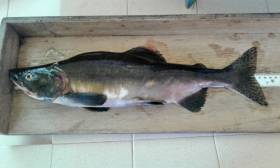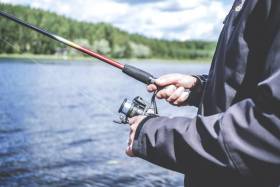Displaying items by tag: Inland Fisheries Ireland
North Cork Creameries Co-Op Pleads Guilty To Polluting Allow River In Kanturk
North Cork Creameries Co-operative Ltd pleaded guilty on two charges in relation to a pollution incident on the Allow River in Co Cork last year at a sitting of Mallow District Court on Tuesday 17 September.
The charges followed an investigation by Inland Fisheries Ireland (IFI) in relation to a milk spillage into the river at Kanturk during August 2018.
The court heard that the incident occurred during a tanker loading process at the company’s production facility in Kanturk, which then discharged to the river.
Judge Brian Sheridan granted probation after hearing evidence that the defendant company had made a significant investment to upgrade their facilities in recent years and that a conviction would have a detrimental effect on the company’s wellbeing.
The court awarded €2,654 for costs and expenses to IFI and ordered the co-op to make a payment of €7,500 to the local angling club.
North Cork Creameries Co-operative was previously prosecuted by IFI in the Circuit Court in 2012 for similar offences, and it also received the benefit of the Probation Act in the District Court in 2018 following a prosecution by Cork County Council under the Local Government (Water Pollution) Act.
Commenting on the case, IFI senior fisheries environmental officer Andrew Gillespie said: “Protection of fish stocks is vital to maintaining an extremely valuable natural resource for the benefit of local and tourist anglers alike.
“The River Allow and its tributaries are a prized recreational angling resource with much of the catchment soon to benefit from the locally managed and Government-funded Duhallow Farming for Blue Dot Catchments project.
“The project aims to improve the river water quality and biodiversity via the implementation of beneficial measures by farmers and landowners.”
It’s understood that hundreds if not thousands of fish including brown trout, juvenile salmon and bream may be affected by a fish kill on a tributary of the Bandon River in Co Cork.
Inland Fisheries Ireland (IFI) says it is investigating the fish kill on a minor tributary of the Bandon River in Co Cork in the stream south of Dunmanway near Curraghalicky Lake.
IFI says it attended the site on Monday evening (26 August) following a report from a local angler — and initial investigations point to “a significant algal bloom” as the cause.
“Efforts are ongoing to assess the extent of the fish kill and an aerial survey of the lake is underway,” IFI adds.
“Cork County Council has taken water samples from the lake and river and is liaising with Inland Fisheries Ireland in their investigation.”
Fifteen angling vessels will soon be granted authorisation to participate in Tuna CHART (Catch and Release Tagging), a pilot Bluefin Tuna Data Collection Programme.
As previously reported for Afloat.ie by Lorna Siggins, the programme will see the 15 authorised vessels catch, tag and release Atlantic bluefin tuna for data collection purposes off the Irish coast.
These vessels, which are located in Cork, Clare, Galway, Sligo and Donegal, will support scientific work to increase knowledge of the behaviour and abundance of bluefin tuna in Irish waters — which currently do not host a sport or commercial fishery for the species.
The new programme, which has been developed by Inland Fisheries Ireland (IFI) and the Marine Institute in partnership with the Sea Fisheries Protection Authority (SFPA), the Department of Agriculture, Food and the Marine and the Department for Communications, Climate Action and Environment (DCCAE), will operate on a pilot basis this year.
Authorisations will be granted from mid-August until mid-October, and all skippers and trained crew have participated in training with guidance provided around fish handling, welfare, tagging and data recording.
Participants in the programme will catch, tag and release bluefin tuna while adhering to strict fish safety and handling procedures at all times.
Marine Minister Michael Creed has welcomed the initiative. “My department has been working on this project for two years at both EU and domestic levels and I am happy to announce the commencement of the project this month,” he said.
“This initiative will allow the Marine Institute and Inland Fisheries Ireland to collect valuable data on the migratory patterns of bluefin tuna in Irish waters in a tightly controlled environment.
“This project has been a wonderful example of co-operation between my department, DCCAE, SFPA, IFI and the Marine Institute and I am looking forward to the continued development of this relationship.”
Sean Canney, Minister with responsibility for inland fisheries, added: “The angling vessels which will be receiving authorisation from my department will contribute in a very tangible way to important data collection around Bluefin tuna as they migrate past the Irish coastline.
“The recreational fisheries sector is crucial in the delivery of this pilot programme and we look forward to working with all the State agencies involved and critically with the skippers and their crews who have received authorisations in providing valuable data for scientific purposes.”
The SFPA and IFI will undertake inspections and patrols around the coast to ensure this remains a strictly controlled fishery.
Anglers wishing to engage in this fishery must only do so on a sea angling vessel specifically authorised to participate in the pilot programme. Any person engaging in this fishery on any vessel which is not appropriately authorised will be in breach of the Sea-Fisheries and Maritime Jurisdiction (Bluefin Tuna) Regulations 2019 (SI No 265 of 2019).
Warning To Anglers Over Rogue Fishing License Website
Inland Fisheries Ireland (IFI) is alerting the public to a rogue website which claims to sell salmon and sea trout angling licenses for Ireland.
The website, which carries IFI branding, asks anglers for their personal and payment details but does not supply legitimate fishing licenses.
Anglers are reminded that the only authorised website for salmon & sea trout licenses is at store.fishinginireland.info
This site is operated by IFI, and anglers will receive receipt of any purchases on this website via email.
IFI advises any member of the public who has submitted personal or financial details to a fraudulent fishing license website to contact their local Garda station directly to report the incident.
New €140,000 Angling Facility In Monaghan Hopes To Attract International Competitions
Enterprise Minister Heather Humphreys was on hand yesterday (Monday 29 July) to help Monaghan County Council open its new €140,000 angling facility at Lough Muckno in Castleblayney.
The upgraded facility, which was funded by Inland Fisheries Ireland (IFI) through its National Strategy for Angling Development, is hoped to attract international angling competitions and visiting anglers.
The fisheries development project saw the opening of an inaccessible angling stretch and the addition of 40 new coarse angling pegs along the shoreline which were required to cater for the lough’s growing number of anglers.
In addition, a new access point to the lough was developed for anglers incorporating 500m of road access, a vehicular access track beside the lake shore and new car parking spaces. IFI provided funding of €105,248 while Monaghan County Council contributed €35,000 to the project.
Minister Humphreys welcomed the upgrades. “Lough Muckno is a renowned angling destination and a valuable amenity to the community at large, offering significant value from both a tourism and recreational perspective. I am delighted to see investment in this facility which ensures it remains at international match standard,” she said.
The project is just one of many fisheries development schemes being delivered across the country under the National Strategy for Angling Development, which IFI touts as the first comprehensives national framework for the development of the angling resource.
The strategy provides opportunities for habitat improvement along with funding which will improve angling access and tourism development.
Cllr Seamus Coyle, Cathaoirleach of Monaghan County Council, said: “The development of this new stretch was required because of the success and popularity of the three previously developed sections on the lake.
“Because these stretches are regularly booked to capacity, it was important to provide another stretch to cater for all those who want to fish the lake and this is where South Lodge comes in.
“I have no doubt that this development will have a significant impact on the local economy and look forward to welcoming more international visitors to Castleblayney”
Dr Ciaran Byrne, IFI chief executive, added: “Lough Muckno has been extremely effective in attracting angling visitors to the town of Castleblaney over the years and this has had a positive economic impact on the area.
“It is fantastic to see rural communities engaging around the angling resource and we continue to support projects nationwide which look to support the improvement of fish habitats and remove barriers to accessing the fisheries resource.”
Inland Fisheries Ireland Secured Prosecution Of Landowner Who Removed Gravel From Munster Blackwater
Inland Fisheries Ireland (IFI) secured a conviction against Mr Bryan O’Neill, a riparian landowner on the Munster Blackwater, for removing spawning gravel during last summer’s drought.
On Tuesday 16 July, Judge John King convicted Mr O’Neill at a special sitting of Mallow District Court under Section 173 1 (d) of the Fisheries (Consolidation) Act 1959 for disturbing spawning beds at Gortmore, west of Mallow on the upper Blackwater.
The court heard evidence from Senior Fisheries Environmental Officer (SFEO) Andrew Gillespie that on or around 1 July 2018, large amounts of spawning gravel had been excavated from the river and deposited at a disused quarry adjacent to the river.
Evidence was heard concerning tracks leading from the river across Mr O’Neill’s land to the quarry. The scale of the extraction led SFEO Gillespie to believe the gravel was being removed for commercial reasons.
The court also heard of IFI’s difficulties serving the court summons to Mr O’Neill and that ultimately the assistance of local gardaí was required to do so.
Mr O’Neill denied the charges and claimed that it was his brother who farmed the land and that he himself had been unaware of the gravel extraction until contacted by Cork County Council in September that year.
Convicting Mr O’Neill, Judge King advised the defendant that his evidence was “not credible”, imposed a fine of €500 and awarded costs of €3,388 to IFI.
Sean Long, director of the South Western River Basin District at IFI, said: “This is an important outcome for the Munster Blackwater and Inland Fisheries Ireland. Riparian owners cannot plead ignorance to avoid responsibility for illegal, damaging works carried out on their lands.
“The removal of so many tons of valuable spawning gravels for minor commercial reward demonstrates a callous disregard for the critically endangered indigenous salmonid and lamprey populations, as well as for the wider community that promotes and benefits from responsible angling practices the length of the Munster Blackwater.
“The maintenance of this vulnerable aquatic habitat is vital if we are to sustain and enable wild fish populations to thrive. We are working to protect, conserve and develop our natural fisheries resource which is of significant recreational and economic value to communities in Munster and across the country.
“We encourage all landowners to contact their advisers or Inland Fisheries Ireland before carrying out and works that may inadvertently damage watercourses on or adjacent to their land.”
Inland Fisheries Ireland (IFI) says it has confirmed a significant fish kill on the Royal Canal in Kilcock, Co Kildare earlier this week.
A report was received on Monday 1 July from Waterways Ireland of the fish kill, which has claimed some 300 fish of various species including roach, rudd, bream and pike.
The investigation, which commenced immediately and remains ongoing, has identified agricultural discharge to a River Ryewater feeder that enters the canal at Kilcock.
IFI says work is now ongoing to ensure that there is no further polluting discharge to the system from this location.
It has also has issued a fresh appeal to farmers to remain vigilant in avoiding water pollution during the summer months when harvesting silage and spreading slurry.
Silage effluent is a significant pollutant and if allowed to enter a waterway can potentially lead to fish death and habitat degradation.
IFI has a confidential hotline number at 1890 34 74 24 or 1890 FISH 24 for the public to report incidents of water pollution, fish kills and illegal fishing. For more visit fisheriesireland.ie.
Inland Fisheries Ireland (IFI) has renewed its appeal to angling enthusiasts and the general public to be vigilant and report the presence of any Pacific pink salmon encountered in Irish river systems over the coming months.
In 2017, this non-native fish species unexpectedly appeared in unprecedented numbers in multiple river systems in the south-west, west and north-west of the country.
As pink salmon predominantly have a two-year lifecycle, there is potential for the species to reappear in Irish rivers again this year and every second, so-called ‘odd’ year thereafter.
However, they can also turn up in ‘even’ years and a single specimen was recorded in the River Suir in 2018.
Also known as humpback salmon, pink salmon are a migratory species, native to river systems in the northern Pacific Ocean and nearby regions of the Bering Sea and Arctic Ocean.
The species also has established populations in rivers in northernmost Norway and in the far northwest of Russia, originating from stocking programmes undertaken in this part of Russia since the 1950s until 2001.
Although a single specimen was first recorded in Ireland in 1973, they were very rare in Irish waters until 2017.
In the past week, pink salmon have been reported returning to rivers further south in Norway than anticipated which increases the likelihood of their reappearance in Irish rivers this year.
“The potential presence of pink salmon in Irish rivers again is of ongoing concern to Inland Fisheries Ireland as its presence in large numbers may negatively impact some of Ireland’s native species such as Atlantic salmon and sea trout as well as estuarine and coastal marine fish species and their associated ecosystems,” says Dr Cathal Gallagher, IFI’s head of R&D.
“Despite only very limited information being currently available to assess such threats, the climatic and environmental conditions in Ireland are considered quite amenable to facilitate the establishment of Pacific pink salmon populations in Irish river systems.”
IFI has developed an identification guide (2.31 MB PDF) to help anglers and the general public identify pink salmon.
Anglers are asked to report catches of pink salmon to IFI’s 24 hour confidential hotline number at 1890 34 74 24 or 1890 FISH 24. As these fish die after spawning, some dead specimens could also be encountered along Irish rivers.
Anyone who catches a pink salmon is asked to:
- Take a photograph of the fish
- Tag the fish and present it to IFI and a new tag will be issued to replace the tag used
- Record the date and location of capture, and the length and weight of the fish
- Keep the fish and do not release it back into the water (even in rivers only open for catch and release angling)
IFI will then arrange collection of the fish for further examination. This will help establish the abundance and extent of distribution of the species in Irish waters.
Inland Fisheries Ireland Welcomes Climate Action Plan
Inland Fisheries Ireland (IFI) says it welcomes the Government’s Climate Action Plan to tackle the growing global climate crisis.
The plan launched yesterday (Monday 17 June), which contains 180 actions to ensure Ireland will meet its 2030 targets for carbon emissions, also sets out how Ireland aims to achieve net zero carbon emissions by 2050.
The plan looks at every sector, including the public sector — with all public bodies set to receive a new climate action mandate to prioritise climate action.
Earlier this year, IFI introduced energy efficient vehicles with a view to achieving a 24% reduction in the C02 emissions from its fleet patrolling inland waterways nationwide.
In addition, IFI says it has implemented a fleet management system to generate additional efficacies.
“This new national plan, together with a new mandate for the public sector offers an opportunity to refocus the philosophy of our organisation,” said IFI chief executive Dr Ciaran Byrne of the announcement.
“As an environmental agency, we are very aware of the critical nature of climate change and the impact it is having on our fisheries resource. We are looking at every aspect of our work to see how we can reduce our environmental footprint.
“The move to ‘green’ vehicles is just one of many changes which we are making to ensure we reduce our overall emissions.”
Others include reducing consumption by half on sea payrolls by introducing modern RIBs as fisheries protection vessel, as well as carrying out patrols by kayak and bicycle where possible.
“We are at a crossroads when it comes to climate change and this plan provides us with a framework to help us make the right choices and build a sustainable future,” Dr Byrne added.
The new Climate Action Plan has not been as warmly received by others, with the likes of the Irish Wildlife Trust agreeing with yesterday’s Irish Times editorial that it shows “little ambition on land use and fails to make the link to biodiversity loss”.
Creeslough & District Angling Association yesterday (Monday 17 June) opened its new angling facility at Lough na Tooey in North Donegal.
The facility, which was co-funded by Inland Fisheries Ireland (IFI) through its National Strategy for Angling Development, was officially launched by Sean Canney, Minister of State with responsibility for inland fisheries.
The facility at Creeslough is one aspect of a development project delivered by the local angling group which manages a number of salmon and trout fisheries in the area.
This project saw the improvement of angling access and infrastructure across three sites in the area: Lough na Tooey, Glen Lough and the Owencarrow River.
New facilities at Lough na Tooey include a slipway and mooring pontoon, boatshed and car park.
At Glen Lough, a new improved roadway over 1.2km leading to the angling site was constructed, while at Owencarrow, 15 stiles and ladders and 33 fishing stands were erected over 300m of the river bank.
IFI provided funding of over €216,000 with Creeslough & District Angling Association providing match funding of €30,000 to enable the completion of the project.
Minister Canney welcomed the project’s completion, saying: “The new facilities will enable safe and easier access to the fishery for the local community, while also supporting tourism in North Donegal.
“This is a first-class angling site located in a county renowned for its beautiful scenery and superb angling resource. As a result of this project, more local and visiting anglers will be fishing in the area, which in turn will provide both recreational and economic benefits for the community.”
IFI chief executive Dr Ciaran Byrne noted that Creeslough & District Angling Association “initiated and delivered these facilities on the ground by taking a collaborative approach and working across their entire fishery to identify where improvements were needed.
“Rural communities are engaging around the angling resource and demand for support continues apace. We look forward to partnering with more clubs and associations on the delivery of fisheries projects and will announce those successful in securing funding from our latest funding call over the coming months.”
Paddy Boyle of the Creeslough & District Angling Association said: “Fishing as a sport and recreation is dependent on the quality of the natural environment around us. Angling clubs have a role as custodians of this wonderful resource, and we owe it to future generations to look after the fish and their habitat.
“This development at Creeslough is proof of what angling clubs can achieve in partnership with local development agencies and Inland Fisheries Ireland. We asked for their help and got it because we presented them with a well thought-out plan for the conservation and development of our fisheries.”




























